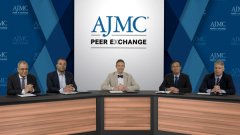
Managing Adverse Events to Sustain Continuity in HCC Treatment
Treatment continuity and adherence in HCC can be encouraged through patient education and engagement.
Episodes in this series

In this segment of the video discussion, the medical experts focus on the critical importance of effectively managing adverse events (AEs) associated with the treatment of hepatocellular carcinoma (HCC). They stress the significance of patient education, proactive physician engagement, and the essential role of a multidisciplinary team in handling AEs. The panel highlights the complexity of managing AEs, especially in the context of community settings where patient populations often present with multiple medical issues in addition to their liver disease. The experts emphasize the need for a comprehensive approach, involving various specialists such as rheumatologists, endocrinologists, and gastroenterologists, in order to manage the diverse range of AEs effectively.
Kim, one of the experts, underscores the importance of closely monitoring and educating patients about the potential adverse effects of treatments, enabling them to identify and manage symptoms effectively. He emphasizes the role of patient education in ensuring treatment adherence and better quality of life for HCC patients. The experts also discuss the challenges of managing AEs in community hospitals, where a lack of specialized resources can pose difficulties in handling acute situations, such as gastrointestinal bleeding incidents.
Furthermore, the conversation delves into the necessity of aligning the comprehensive approach with long-term patient outcomes and quality of life. Abou-Alfa highlights the need for a holistic perspective, considering the impacts of AEs on the patient’s overall well-being. He emphasizes the need to strike a balance between maximizing treatment benefits and minimizing potential risks and disruptions to the patient’s quality of life. The experts also emphasize the need to tailor the management of AEs to suit the individual needs of HCC patients.
The panel discusses the challenges of integrating the outcomes from clinical trials with the real-world patient scenarios, stressing the importance of developing an approach that effectively addresses the specific needs and concerns of the broader patient population. They highlight the significance of a multidisciplinary approach, particularly in managing the long-term adverse effects of immunotherapies. Dietrich underlines the importance of involving various specialists, including rheumatologists and endocrinologists, in managing the complex adverse effect profile associated with HCC treatments.
The discussion concludes with an emphasis on the importance of providing ongoing surveillance and support for HCC patients, along with effective management of the reversible and manageable AEs. The experts advocate for a patient-centered approach that takes into account not only the physical aspects of the disease but also the patient’s emotional and psychological well-being. They stress the need for continuous patient education and support, ensuring that the patients have access to necessary resources and information for their well-being and treatment adherence.
Newsletter
Stay ahead of policy, cost, and value—subscribe to AJMC for expert insights at the intersection of clinical care and health economics.









